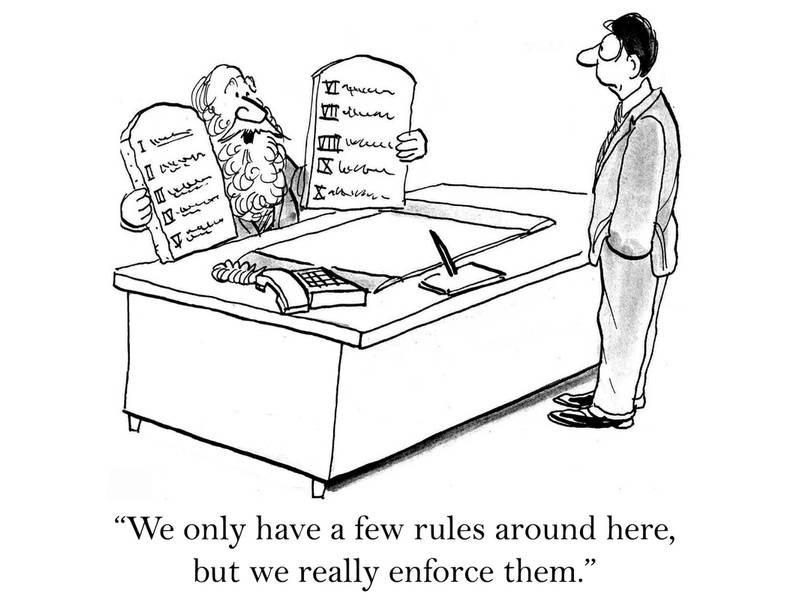"Only One Stupid Thing at a Time"
This story spans a long period of time, but begins with a note I received recently on an earlier column from a reader named Allan Berger. He commented on the OODA loop concept in my “Pondering Truths in Design” column in the September MREN issue.
He provided his approach that closely follows the OODA loop concept, which follows the principle of always gathering all the facts before speaking. That led to a discussion on decision making. Decision making is an extremely important concept that sets the course of human development, and is central to effective engineering. There have been many efforts at developing decision making tools, some quite ancient like the Decalogue:

- You shall have no other gods before Me.
- You shall make no idols.
- You shall not take the name of the Lord your God in vain.
- Keep the Sabbath day holy.
- Honor your father and your mother.
- You shall not murder.
- You shall not commit adultery.
- You shall not steal.
- You shall not bear false witness against your neighbor.
- You shall not covet.
The whole story of the Decalogue is fascinating and just reading the Wikipedia Article on the subject will undoubtedly shed some new light on anybody’s understanding of this list, but just a single read makes it apparent that it is a decision making tool. What is clear though is that it not terribly useful for modern day engineering, although “you shall not steal and not bearing false witness” certainly should apply to Government Shipbuilding (and I mean that in all directions).
Many decades ago, in my more idealistic days, at the suggestion of a friend who told me that when he was young he got kicked out of church for suggesting that it was time for an update of the Bible, I tried my hand at a decalogue that would be a universal decision making tool and after a deep think came up with the following:
- Things are always changing (change is constant)
- First do no irreversible harm
- Consider the cost of action through the entire chain
- Look for efficiencies
- Moderation
- Communicate
- Fairness from both points of view
- Cooperate
- Allow individual freedoms to an extreme if they do not harm others
- One is personally responsible for actions on public knowledge
I was proud of my hard work and even introduced my kids to it. They never memorized them (that is genetic, I can’t do rote memorization either), but as a parent I will venture to state that in general they are good at making complex decisions and appear to follow my decalogue. However, that is as far as it went. I might have come down the mountain, but it turned out there was really no one there.
So one day my son was being wild and I said: “Hey Bud, do yourself a favor only do one stupid thing at a time”. He looked at me, paused and said “OK,” and dialed his wildness down to one stupid thing. Bizarrely that decision making tool stuck and my nieces and nephews and my kids’ friends tell me they use it too.
At first glance “Only do one stupid thing at a time” has a weird indeterminate quality, but if you work with examples, it becomes brilliant. Underage drinking by itself is probably no big deal, but don’t set off fireworks at the same time.
The trick is to recognize you are engaging a risk, and since you are engaging a risk you do not want to compound the risk by adding another risk. Once I even heard a kid say it when he was ready to snowboard on a steep run. I asked him where he got it, and it turned out he got it through my son’s scout troop.
Weirdly the rule has worked its way back into my business and existed before I even knew it. Before I developed my decalogue, as a young salvage Naval Architect, I developed a salvage plan, and it involved many simultaneous steps to get it to work. The very experienced salvage master looked at it for a second and then said: “What the $%#@ do you think we are? The $%#@ing Navy? One step at a time.”
Since everything in salvage carries risk, it simply translates to: Only do one stupid thing at a time.
We have thousands of years of experience that shows that, even with the fear of God, long lists of decision making rules are not that successful. We need to keep it short and whether one uses Allan Berger’s rule or the “Only One Stupid Thing at a Time” rule (OOSTT?), decision making requires analysis of risks and sorting of risks. Risk in all of life is unavoidable, the winners manage risk, the losers don’t. To quote another good one: Don’t paint yourself into a corner and that goes for small personal decisions and for billion dollar Government Shipbuilding projects.
For each column I write, MREN has agreed to make a small donation to a charity of my choice. For this column I nominate Gapminder.org, Hans and Ole Rosling’s brilliant decision making tool.
